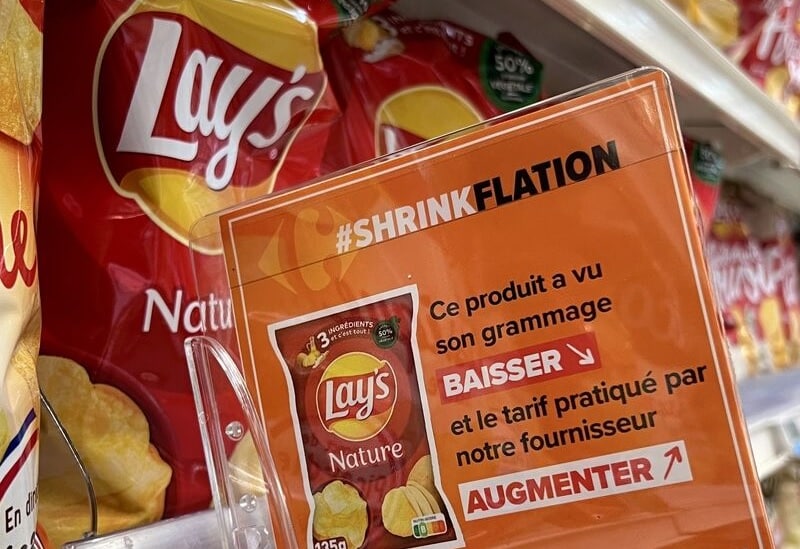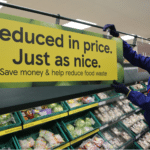
What’s the best way to combat inflation at the grocery store? Switch to less-expensive alternatives, lower your expectations – or publicly shame brands and retailers that try to sneak price increases past you?
Some countries are choosing the last option, calling out brands and retailers for raising prices and not being up front about it. And if it works there, those who are tired of rising prices in the U.S. might consider the same tactics.
The French grocery chain Carrefour has made headlines by naming and shaming brands that charge the same or higher price for less product. You may know it best as “shrinkflation,” when a product package gets smaller while the price stays about the same – a sneaky way to soften the blow of inflation by making you pay more for less.
On its website and throughout its stores, Carrefour has slapped “shrinkflation” labels like the one shown above, on more than two dozen products, from Lay’s to Lipton to Lindt chocolates, so no one is fooled by their suddenly-shrunken packages. “This product has seen its weight decrease and the price charged by our supplier increase. We are committed to renegotiating this price,” the labels read.
“The aim in stigmatizing these products is to be able to tell manufacturers to rethink their pricing policy,” Carrefour director of client communications Stefen Bompais told Reuters. He said the warnings will remain in place until suppliers of those products agree to price cuts commensurate with their reduced package sizes.
France isn’t the only place where shoppers are being warned about grocery pricing practices. Back in July, regulators in the UK warned that some retailers were using confusing labeling and unit pricing, leaving shoppers unable to figure out the best deals or whether they’re truly getting their money’s worth. Among the problems they found in stores were incorrect, missing or illegible unit prices, or different measures used to calculate unit prices for the same type of product. Boxes of tea bags, for example, might be priced by weight, while other boxes on the same shelf are priced per tea bag, leaving shoppers unable to compare their apples to their orange pekoe.
UK regulators called out retailers who engage in these confusing practices, deliberately or otherwise, and said if they don’t solve the problem themselves, the government will. “We have written directly to certain supermarkets and variety store retailers to tell them to take action to address the concerns that we have identified,” the Competition and Markets Authority said in a statement. “We will be monitoring compliance and we are ready to take enforcement action if we do not see improvements.”
And our neighbors to the north are threatening similar action against retailers if they don’t come up with a plan to “stabilize” grocery prices. “Large grocery chains are making record profits,” Canadian Prime Minister Justin Trudeau said last week. “Those profits should not be made on the backs of people who are struggling to feed their families.” He threatened to hit retailers with higher taxes if they don’t comply.
But retailers in Canada aren’t taking this public shaming lying down. “Grocer prices and profits have nothing to do with it,” the Retail Council of Canada industry group fired back in a statement. “The price on grocery shelves is driven by increased vendor costs from food manufacturers and producers.” The group went on to say that taxes and government regulations are contributing to higher prices, so more taxes won’t solve anything. “We are not going to take part in discussions that time and time again fail to look below the surface as to the true cause of rising grocery prices.”
Altogether, it appears there’s a lot of blame going around. Shoppers are blaming retailers for their higher prices, and manufacturers for their smaller packages. Retailers are blaming manufacturers for making them look bad to sticker-shocked shoppers, while manufacturers are blaming retailers for pressuring them to single-handedly solve the problem of grocery inflation. And governments are blaming them both.
So be on the lookout for confusing unit prices, unexpected price hikes, or potentially more “shrinkflation” warnings coming to a grocery store near you. The causes of inflation are complicated, and blaming and shaming may not solve the problem. But if it helps keep the focus on trying to tame soaring prices, it’s a tactic we just might see more of in the weeks and months to come.
Image source: Carrefour











Fidel’s son is a moron. Raise taxes on the retailers, and they’ll just raise their prices more. Typical communist non solution. Canadian voters are almost as dumb as American ones. At least their President isn’t senile though right?